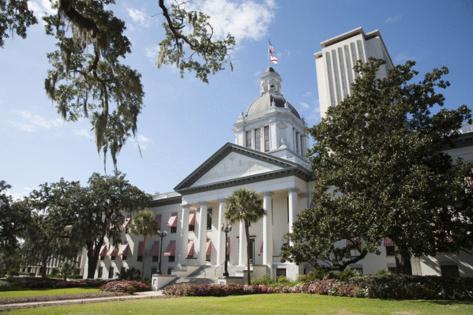Florida Legislature deadlocks over tax relief, stalling budget talks
Published in News & Features
TALLAHASSEE, Fla. — Florida state lawmakers are in a budget standstill as they enter the final stretch of their spring session, with legislative leaders and Gov. Ron DeSantis at odds on how to best provide tax relief to Floridians.
Senate President Ben Albritton told senators Thursday that no spending deal has been reached with the House and that they were free to head home for a three-day weekend. That means legislators won’t finish budget negotiations in time to end their session as scheduled on May 2.
“The biggest hurdle at this time is related to tax relief, both the number and the policy,” Albritton said.
Although it appears Floridians will likely see a tax break of some sort, DeSantis and legislative leaders all have offered different proposals and have yet to reach a consensus. Lawmakers must pass a budget before July 1, and the governor has line-item veto authority over spending.
Albritton and House Speaker Daniel Perez want to provide a sales tax break, but the House’s plan goes further. DeSantis has called for $1,000 property tax rebates for primary residences, saying that would be a bigger help for Floridians.
At an event in Naples on Tuesday, DeSantis slammed state representatives, part of a growing rift between him and the Florida House.
“On so many issues, they have just gone AWOL,” he said. “They are not doing anything to address my call for property tax relief.”
The House’s tax plan would lower the sales tax from 6% to 5.25%, providing taxpayers savings of about $5 billion. The Senate’s plan includes about $3 billion in recurring and one-time tax breaks. It would eliminate sales tax for clothes and shoes priced at $75 or less, reduce the business rent tax and provide a one-time credit on vehicle-registration fees.
Albritton, a Republican said he has concerns the House’s proposal could lead to budget shortfalls in the future.
“I am committed to passing historic, unprecedented tax relief,” he said. “However, it won’t be at the expense of the long-term financial stability of our state.”
In a fiery speech late Thursday, Perez vowed to fight for a smaller budget, adding that he thinks the Legislature has been “addicted to spending” and slashing the sales tax would help fix that.
“We will hold the course until we can vote on a fiscally conservative budget that genuinely addresses the state’s spending problem and provides meaningful tax relief to people of this state,” he said. “The real danger to the state budget is the habit of pathological overspending that is enshrined in the Senate’s budget.”
DeSantis’ ultimate goal is to eliminate property taxes entirely, and he wants to put a proposal to do that on the 2026 ballot. That would require the support of at least 60% of voters to pass.
Scrapping property taxes would threaten billions of dollars cities, schools and counties allocate to educate children, pave roads, maintain parks and police neighborhoods, among other civic functions. Some analysts say such a cut would be doable only if state leaders hiked the sales tax considerably.
Budget negotiators are also hashing out proposed changes to Florida’s hotel tax, a key source of revenue for Central Florida’s tourism economy. Orange County collects roughly $360 million from visitors annually, which is used for the tourism marketing organization Visit Orlando, the convention center, and sporting and arts venues.
The House’s tax plan would require that money be used to lower property tax bills starting in 2026, less any grandfathered debt commitments. The Senate’s plan eases the mandatory spending requirement for tourism marketing, while keeping the tax intact.
©2025 Orlando Sentinel. Visit orlandosentinel.com. Distributed by Tribune Content Agency, LLC.







Comments